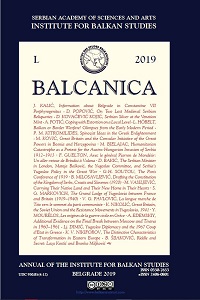The Serbian Minister in London, Mateja Bošković, the Yugoslav Committee, and Serbia’s Yugoslav Policy in the Great War 1914–1916
The Serbian Minister in London, Mateja Bošković, the Yugoslav Committee, and Serbia’s Yugoslav Policy in the Great War 1914–1916
Author(s): Dragan BakićSubject(s): History
Published by: Balkanološki institut - Srpska akademija nauka i umetnosti
Keywords: Mateja Mata Bošković;Yugoslav Committee;Serbia;Yugoslavia;Nikola Pašić;British (English) friends of Serbia;R. W. Seton-Watson;First World War
Summary/Abstract: This paper seeks to examine the outlook of the Serbian Minister in London, Mateja Mata Bošković, during the first half of the Great War on the South Slav (Yugoslav) question – a unification of all the Serbs, Croats and Slovenes in a single state, which was Serbia’s war aim. He found himself in close contact with the members of the Yugoslav Committee, an organisation of the irredentist Yugoslav émigrés from Austria-Hungary in which two Croat politicians, Frano Supilo and Ante Trumbić, were leading figures. In stark contrast to other Serbian diplomats, Bošković was not enthusiastic about Yugoslav unification. He suspected the Croat émigrés, especially Supilo, of pursuing exclusive Croat interests under the ruse of the Yugoslav programme. His dealings with them were made more difficult on account of the siding of a group of British “friends of Serbia”, the most prominent of which were Robert William Seton-Watson and Henry Wickham Steed, with the Croat émigrés. Though not opposed in principle to an integral Yugoslav unification, Bošković preferred staunch defence of Serbian Macedonia from Bulgarian ambitions and the acquisition of Serb-populated provinces in southern Hungary, while in the west he seems to have been content with the annexation of Bosnia-Herzegovina, part of Slavonia and an outlet to the Adriatic Sea in Dalmatia. Finally, the reception of and reaction to Bošković’s reports on the part of the Serbian Prime Minister, Nikola Pašić, clearly shows that the latter was determined to persist in his Yugoslav policy, despite the Treaty of London which assigned large parts of the Slovene and Croat lands to Italy and made the creation of Yugoslavia an unlikely proposition. In other words, Pašić did not vacillate between the “small” and the “large programme”, between Yugoslavia and Greater Serbia, as it has been often alleged in historiography and public discourse
Journal: BALCANICA
- Issue Year: 2019
- Issue No: 50
- Page Range: 173-216
- Page Count: 46
- Language: English

